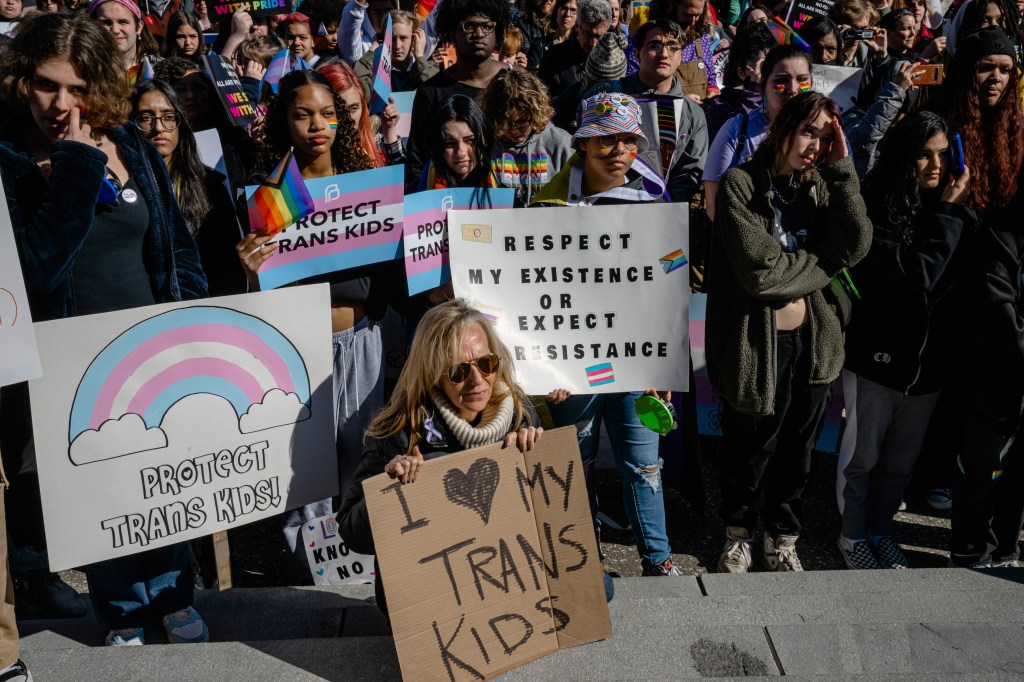Idaho ‘teacher of the year’ winner flees state after attacks on her pro-LGBTQ+ views

Idaho teacher of the year flees to Illinois due to attacks over pro-LGBTQ+ views (Anatoliy Cherkasov/SOPA Images/LightRocket via Getty Images)
A woman who was named “Teacher of the Year” in Idaho has moved state following intense criticism of her views on LGBTQ+ issues and Black Lives Matter.
Karen Lauritzen, named Idaho Teacher of the Year in September 2022, said she is no longer teaching in Idaho after receiving intense scrutiny of her pro-LGBTQ+ views, despite not including LGBTQ+ subjects on her curriculum.
It has been reported that, despite Lauritzen’s win – which was awarded after a “rigorous” application process – after being named Teacher of the Year, she was met with right-wing attacks accusing her of “promoting transgenderism” at school, and being a “left-wing activist”.
The Boston Globe reported that she will now take up a new role a university in Illinois.
The fourth-grade teacher said the attacks were based on personal social media posts supporting Black Lives Matter and the LGBTQ+ community, despite her not teaching any LGBTQ+ topics in the classroom. She told the outlet this affected her professional life, with parents emailing and questioning her on her curriculum.
“I should have felt celebrated and should have felt like this is a great year, and honestly it was one of the toughest years I have ever had teaching, not only with my community but with parents questioning every decision I made as well,” Lauritzen told The Boston Globe.
She added: “Even if I have certain beliefs myself, that does not mean that I teach kids. It’s not my job to ‘indoctrinate’ or make kids little versions of myself. It’s to make kids into the best versions of themselves.”

In an investigation by the newspaper, it was found some states have begun to implement changes to their Teacher of the Year application process, with the essay questions which are part of most states’ process now sometimes containing a political slant.
The newspaper found that in Arkansas, applicants are encouraged to praise Sarah Huckabee Sanders’ controversial education law which in part bans teaching concepts such as “critical race theory” and gender identity or sexual orientation for younger kids. However in Georgia, its Teacher of the Year application states that the winner “must refrain from voicing political views on any platform”.
On the other end of the political spectrum, Massachusetts requires that its Teacher of the Year candidates “center equity and anti-racism in their practice”.
Democratic representative for Connecticut Jahana Hayes, former Teacher of the Year, said political questions are “completely inappropriate”.
“I worry that it will make people who are nominated for or would be amazing teacher-leaders say they don’t even want to participate in the process because it feels so uncomfortable and antithetical to what teachers actually do,” Hayes told the newspaper.
Rising anti-LGBTQ+ laws mean teachers “don’t feel valued”
The investigation comes as several teachers have protested Florida’s “Don’t Say Gay” law, which came into force in March 2022, prohibiting classroom discussion on LGBTQ+ issues.
Inclusive teachers have explained that right-wingers have made them out to be “groomers” who are trying to “indoctrinate” children on LGBTQ+ subjects.
Michael Woods, a gay special education teacher in Florida, told PinkNews that it feels like “we’ve gotten in a DeLorean in Back to the Future and gone back to the early 80s”.
He added: “I teach students with disabilities, of all ability levels. Of course, we’ve always addressed their needs and made sure that it’s understandable to them, but what I fear most as an educator is who determines what is age-appropriate?
“This legislature has made it sound as if we, as teachers, don’t know how to determine what is age-appropriate.”
The law so far has seen teachers investigated for showing movies in class with queer characters, or even fired for teaching inclusive books to their students.
Lauritzen added that laws questioning teachers’ judgement on certain topics makes them not feel “valued”.
She told The Boston Globe: “If you can’t pay them well, they at least need to feel that you value their judgment, they’re doing good things, and [they] have children’s best interest at heart. And when you take all that away – what’s left?”

